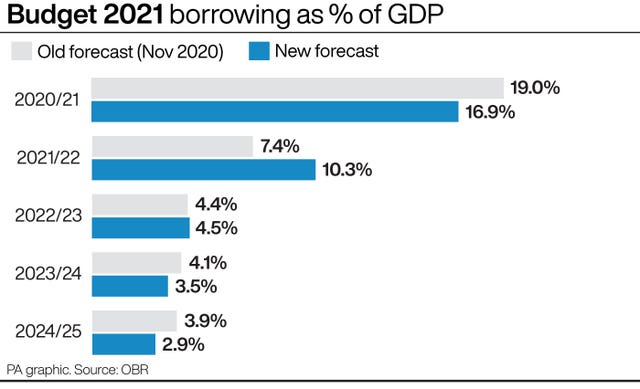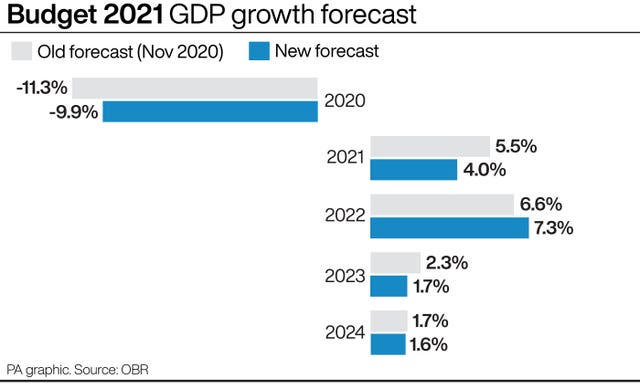
James O'Brien 10am - 1pm
3 March 2021, 17:34

The Office for Budget Responsibility predicts the economy will recover to pre-crisis level by the middle of next year.
Britain’s vaccination efforts will help the economy recover faster than expected but Government borrowing will balloon to record peacetime levels this year and next, according to the fiscal watchdog.
The Office for Budget Responsibility (OBR) is predicting the economy will recover to pre-crisis level by the middle of 2022 – six months earlier than previously expected – thanks to a “swifter and more sustained recovery”.
Unemployment caused by the pandemic will be lower than expected, peaking at 6.5%, down from 7.5% predicted last November.
This will mean 340,000 fewer people out of work than previously thought thanks largely to the decision to extend furlough until September.
The OBR hiked its outlook for gross domestic product (GDP) – a measure of the size of the economy – for 2022 to 7.3% from 6.6% previously.
But Chancellor Rishi Sunak warned the crisis will do “profound damage” to the economy, with the OBR still forecasting it will be 3% smaller in five years due to the crisis than it would have been.
While upping the outlook for next year, the OBR also slashed its GDP forecast for every other year until 2025, including a cut for this year to 4% from the 5.5% growth previously pencilled in.
This follows the biggest plunge in the UK economy for more than 300 years in 2020, with GDP tumbling 10%.
The independent forecaster also laid bare the toll on the public finances from more than £400 billion of Covid-19 support to businesses and households.

It is predicting Government borrowing will soar to £355 billion in 2020/21 – lower than the £394 billion first forecast but still 17% of national income and the highest level since the Second World War.
Borrowing will remain at eye-watering levels in 2021/22 at £234 billion, up from the £164.2 billion pencilled in before and 10.3% of GDP, but will fall gradually to 2.8% in 2025/26.
Mr Sunak said: “The amount we’ve borrowed is only comparable with the amount we borrowed during the two world wars. It is going to be the work of many governments, over many decades, to pay it back.”
The OBR cautioned the GDP outlook could be worse than outlined in its central forecast if the vaccination programme suffers setbacks or if there are further lockdowns.

Its forecasts also reveal a hit to GDP of 0.5% from Brexit disruption in the first quarter, with export of UK goods and supply chains impacted by border delays.
Combined with the third national lockdown in England, this will see GDP drop 3.8% in the first quarter, according to the OBR, before bouncing back by 3.9% in the following three months.
Richard Hughes, chairman of the OBR, said: “Two things that are different now compared to our forecasts back in November, about the environment for business investment.
“One is that there’s much more certainty about the effectiveness of vaccines, as well as the timetable for that rollout, which I think provides more confidence than we had back in November, about the sustainability and pace of the recovery.
“And the second thing is that when we were doing our November forecasts, we didn’t know the final outcome of the Brexit negotiations or indeed whether there’s going to be any deal at all.
“And it has certainly been a case of, since the referendum, one of the things which we think has been suppressing business investment has been uncertainty about the nature of our future relationship with the EU.
March 2021 forecasts published – more highlights and charts to follow 📘
Richard Hughes explains five things you need to know about our forecast #Budget2021
Data and supporting documents are now available on our website: https://t.co/8BvGqKugOu pic.twitter.com/QsF4msXtfl
— Office for Budget Responsibility (@OBR_UK) March 3, 2021
“That is now more certain as regards trade and goods, I think there remains some uncertainty about the nature of our future trading relationship on services.”
He warned that if the forecasts depended on the Government hitting its rollout targets for the vaccine, they could be impacted should there be any setbacks.
He explained: “We are assuming in our forecast at the moment that the timetable set out in the road map for lifting restrictions on different parts of the economy is adhered to.
“If that timetable is delayed and the lifting of restrictions in different parts of the economy takes longer, then that means it would actually delay the recovery that we’re forecasting.”
The levels of scarring to the economy predicted by the OCR remains unchanged, despite the new restrictions that had been introduced since the last forecast in November.
Mr Hughes said there was still some time before the full extent of scarring becomes clear.
He added: “We have very limited information at this stage about evidence of the extent of the scarring effect and it will be some time before we really know very much at all.”